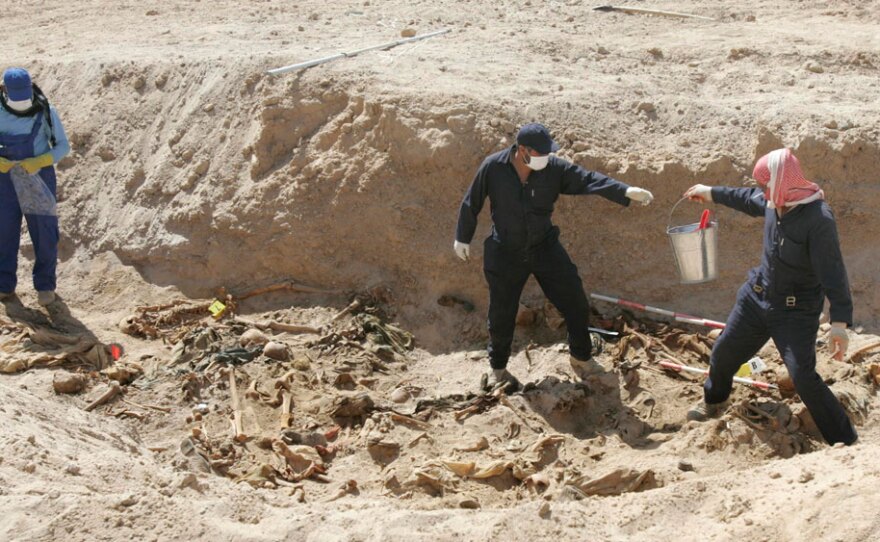In western Iraq, authorities have discovered a mass grave they say holds the remains of more than 800 people who are thought to have been killed during the rule of Saddam Hussein.
It's believed the country has hundreds of mass graves from the Saddam era — and countless new graves from more recent conflicts. But not all sites get the same treatment.
Into The Grave
Down in the recently discovered grave, a set of remains lies along with the person's belongings. All that's left of the person is a skeleton — hip bone, joints, vertebrae. There's a skull with a bullet hole.
Local human rights chief Khudeir Hamdan says teams will take these skulls and test their DNA, then try to match them with DNA from families who have reported their loved ones missing.
Some of the remains were dressed in military uniforms, and some were in civilian clothes, he says. Some were women; some were children.
Hamdan says the victims are thought to be Kurds or Shiites — the main groups that rose up against Saddam. And the same groups that are in power today.
"It fills me with grief and with pain and with bitterness, actually, because I know those people have been killed and dumped in this way only because they have expressed their political opinions," Hamdan says through an interpreter.
Sites like this will not be kept quiet for long. The government is quick to denounce Saddam, who was sentenced to death and executed in 2006. But critics say the government is slower to highlight other human rights abuses.
In recent months, during Iraq's wave of anti-government demonstrations, state TV ran hours of gruesome footage showing people who were tortured by Saddam. Protesters were later arrested and accused of being Baathists or Saddamists.
Hamdan says it's in the ruling party's interest to play up the atrocities of Saddam. Many people use such crimes for political gains, he says, to stay in power. But in some sense they have a right to do that, he says: They lost a lot to Saddam.
Dangerous Divisions?
Analysts in the West and in Iraq worry about this idea that there are winners and losers — that the anti-Saddam Shiites have won, and the pro-Saddam Sunnis have lost.
They say this kind of sectarianism could have dangerous repercussions in a country only a few years beyond a brutal sectarian war, especially now, as sectarian divisions are beginning to surface outside Iraq as well.
Just last week, the Gulf Cooperation Council — a bloc of Sunni-dominated countries led by Saudi Arabia — threatened not to attend an Arab summit that was supposed to be held in Iraq next month that now has been postponed. Many believe that's because Shiite-dominated Iraq supports anti-government protesters in Sunni-run Bahrain.
Back at the grave, a photographer colleague covers the remains with black body bags and shovels dirt on top so the bags won't fly away.
No matter which side you're on, another colleague says later, it's a site that no one should have to see.
Copyright 2022 NPR. To see more, visit https://www.npr.org. 9(MDAzMjM2NDYzMDEyMzc1Njk5NjAxNzY3OQ001))







